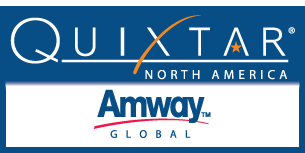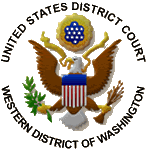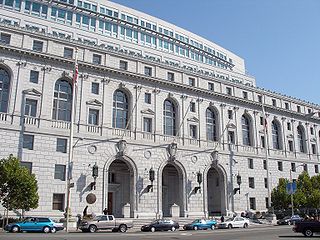Eldred v. Ashcroft, 537 U.S. 186 (2003), was a decision by the Supreme Court of the United States upholding the constitutionality of the 1998 Sonny Bono Copyright Term Extension Act (CTEA). The practical result of this was to prevent a number of works from entering the public domain in 1998 and following years, as would have occurred under the Copyright Act of 1976. Materials which the plaintiffs had worked with and were ready to republish were now unavailable due to copyright restrictions.

Amway North America is an American worldwide multi-level marketing (MLM) company, founded 1959 in Ada, Michigan, United States. It is privately owned by the families of Richard DeVos and Jay Van Andel through Alticor which is the holding company for businesses including Amway, Amway Global, Fulton Innovation, Amway Hotel Corporation, Hatteras Yachts, and manufacturing and logistics company Access Business Group. After the launch of Amway Global, it replaced the Amway business in the United States, Canada and the Caribbean, with the Amway business continuing to operate in other countries around the world. On May 1, 2009, Quixtar made the name change to Amway Global and fused the various different entities of the parent company.
An anonymous post, is an entry on a textboard, anonymous bulletin board system, or other discussion forums like Internet forum, without a screen name or more commonly by using a non-identifiable pseudonym. Some online forums such as Slashdot do not allow such posts, requiring users to be registered either under their real name or utilizing a pseudonym. Others like JuicyCampus, AutoAdmit, 2channel, and other Futaba-based imageboards thrive on anonymity. Users of 4chan, in particular, interact in an anonymous and ephemeral environment that facilitates rapid generation of new trends.
In law, commercial speech is speech or writing on behalf of a business with the intent of earning revenue or a profit. It is economic in nature and usually attempts to persuade consumers to purchase the business's product or service. The Supreme Court of the United States defines commercial speech as speech that "proposes a commercial transaction".
A Doe subpoena is a subpoena that seeks the identity of an unknown defendant to a lawsuit. Most jurisdictions permit a plaintiff who does not yet know a defendant's identity to file suit against John Doe and then use the tools of the discovery process to seek the defendant's true name. A Doe subpoena is often served on an online service provider or ISP for the purpose of identifying the author of an anonymous post.
Buckley v. American Constitutional Law Foundation, Inc., 525 U.S. 182 (1999), was a United States Supreme Court case that dealt with the authority of states to regulate the electoral process, and the point at which state regulations of the electoral process violate the First Amendment freedoms.
Doe v. Reed, 561 U.S. 186 (2010), is a United States Supreme Court case which holds that the disclosure of signatures on a referendum does not violate the Petition Clause of the First Amendment to the United States Constitution.

Doe v. 2themart.com Inc., 140 F. Supp. 2d 1088 (2001), was a federal case decided by United States District Court for the Western District of Washington, on the issue of an individual's First Amendment right to speak anonymously on the Internet and a private party's right to disclose the identity of the anonymous Internet user by enforcing a civil subpoena. The court held that 2TheMart.com (TMRT) failed to show that the identities of these anonymous Internet users were directly and materially relevant to the core defense in the litigation, and thus the subpoena should not be issued. Therefore, Doe's motion to quash the subpoena was granted.
Dendrite International, Inc. v. Doe No. 3, 342 N.J. Super. 134, 775 A.2d 756, is a New Jersey Superior Court case in which Dendrite International, Inc., a purveyor of computer software used in the pharmaceutical industry, brought a John Doe lawsuit against individuals who had anonymously posted criticisms of the company on a Yahoo message board. When Presiding Chancery Judge Kenneth MacKenzie rejected one of Dendrite's requests to compel Yahoo to reveal the identity of an anonymous defendant, Dendrite appealed. The appellate court upheld the district court's decision, and in doing so, created a set of guidelines for determining the circumstances under which an anonymous online speaker may be unmasked. This standard has since been applied to other cases, such as Mobilisa, Inc. v. Doe, Gallucci v. New Jersey On-Line LLC, Independent Newspapers v. Brodie, and The Mortgage Specialists, Inc. v. Implode-Explode Heavy Industries, Inc.

Doe v. Cahill, 884 A.2d 451, is a significant case in the realm of anonymous internet speech and the First Amendment. While similar issues had been tackled involving criticism of a publicly traded company, the case marks the first time the Delaware Supreme Court addressed the issue of anonymous internet speech and defamation "in the context of a case involving political criticism of a public figure."
McIntyre v. Ohio Elections Commission, 514 U.S. 334 (1995), is a case in which the Supreme Court of the United States held that an Ohio statute prohibiting anonymous campaign literature is unconstitutional because it violates the First Amendment to the U.S. Constitution, which protects the freedom of speech. In a 7–2 decision authored by Justice John Paul Stevens, the Court found that the First Amendment protects the decision of an author to remain anonymous.
Sorrell v. IMS Health Inc., 564 U.S. 552 (2011), is a United States Supreme Court case in which the Court held that a Vermont statute that restricted the sale, disclosure, and use of records that revealed the prescribing practices of individual doctors violated the First Amendment.

Doe v. Shurtleff, 628 F.3d 1217, was a United States Court of Appeals for the Tenth Circuit case assessing the constitutionality of Utah Code Ann. § 77-27-21.5, a law that requires sex offenders to register their internet identifiers with the state in order to "assist in investigating kidnapping and sex-related crimes, and in apprehending offenders." In this case, a convicted sex offender, appearing anonymously as John Doe, appealed a decision by the United States District Court for the District of Utah to vacate an order enjoining the enforcement of Utah Code Ann. § 77-27-21.5. Even though Doe did not dispute the state's interest in enacting such a statute, he believed that the statute's enforcement ran afoul of his:

Krinsky v. Doe 6, was a decision by the California Court of Appeal, Sixth District, addressing the evidentiary standard required of plaintiffs seeking the identification of anonymous Internet posters. The case addressed defamation and the right to anonymous speech on the Internet. Plaintiff Lisa Krinsky sued Doe 6, an anonymous poster to Yahoo! message boards, for defamation. Krinsky served a subpoena to Yahoo! for Doe 6's identity. Doe 6 filed a motion to quash the subpoena, "contending that he had a First Amendment right to speak anonymously on the Internet."

Obsidian Finance Group, LLC v. Cox is a 2011 case from the United States District Court for the District of Oregon concerning online defamation. Plaintiffs Obsidian Finance Group and its co-founder Kevin Padrick sued Crystal Cox for maintaining several blogs that accused Obsidian and Padrick of corrupt and fraudulent conduct. The court dismissed most of Cox's blog posts as opinion, but found one single post to be more factual in its assertions and therefore defamatory. For that post, the court awarded the plaintiffs $2.5 million in damages. This case is notable for the court's ruling that Cox, as an internet blogger, was not a journalist and was thus not protected by Oregon's media shield laws, although the court later clarified that its ruling did not categorically exclude blogs from being considered media and indicated that its decision was based in part upon Cox offering to remove negative posts for a $2,500 fee. In January 2014 the Ninth Circuit Court affirmed in part and reversed in part the district court's judgment awarding compensatory damages to the bankruptcy trustee. It also ordered a new trial on the blog post at issue.

Sevcik v. Sandoval is the lead case that successfully challenged Nevada's denial of same-sex marriage as mandated by that state's constitution and statutory law. The plaintiffs' complaint was initially filed in the U.S. District Court for the District of Nevada on April 10, 2012, on behalf of several couples denied marriage licenses. These couples challenged the denial on the basis of the U.S. Constitution's Fourteenth Amendment guarantee of equal protection.
National Institute of Family and Life Advocates v. Becerra, 585 U.S. ___ (2018), was a case before the Supreme Court of the United States addressing the constitutionality of California's FACT Act, which mandated that crisis pregnancy centers provide certain disclosures about state services. The law required that licensed centers post visible notices that other options for pregnancy, including abortion, are available from state-sponsored clinics. It also mandated that unlicensed centers post notice of their unlicensed status. The centers, typically run by Christian non-profit groups, challenged the act on the basis that it violated their free speech. After prior reviews in lower courts, the case was brought to the Supreme Court, asking "Whether the disclosures required by the California Reproductive FACT Act violate the protections set forth in the free speech clause of the First Amendment, applicable to the states through the Fourteenth Amendment."
Zauderer v. Office of Disciplinary Counsel of Supreme Court of Ohio, 471 U.S. 626 (1985), was a United States Supreme Court case in which the Court held that states can require an advertiser to disclose certain information without violating the advertiser's First Amendment free speech protections as long as the disclosure requirements are reasonably related to the State's interest in preventing deception of consumers. The decision effected identified that some commercial speech may have weaker First Amendment free speech protections than non-commercial speech and that states can compel such commercial speech to protect their interests; future cases have relied on the "Zauderer standard" to determine the constitutionality of state laws that compel commercial speech as long as the information to be disclosed is "purely factual and uncontroversial".
Mazurek v. Armstrong, 520 U.S. 968 (1997), was a United States Supreme Court case in which the Court upheld a Montana law permitting only licensed physicians to perform abortions. The Court summarily reversed a ruling of the United States Court of Appeals for the Ninth Circuit that had held that the law was likely intended to inhibit abortion access. In a per curiam opinion, a majority of the Court found that there was no evidence that the Montana legislature acted with an invalid intent. The Court also reiterated its earlier holding in Planned Parenthood v. Casey that the states have broad flexibility to regulate abortion so long as their regulations do not create an undue burden on a woman's right to choose. Three dissenting justices, in an opinion by Justice John Paul Stevens, wrote that they would have declined to hear the case because proceedings were still pending in the lower courts. The law itself was later struck down by the Montana Supreme Court on state-constitutional grounds, but the U.S. Supreme Court's decision has nonetheless had a significant impact on modern American abortion jurisprudence.
Americans for Prosperity Foundation v. Bonta, 141 S.Ct. 2373 (2021), is a United States Supreme Court case dealing with the disclosure of donors to non-profit organizations. The case challenged California's requirement that requires non-profit organizations to disclose the identity of their donors to the state's Attorney General as a precondition of soliciting donations in the state. The case was consolidated with Thomas More Law Center v. Bonta. In July 2021, the Supreme Court ruled in a 6–3 decision that California's requirement burdened the donors' First Amendment rights, was not narrowly tailored, and was constitutionally invalid.






